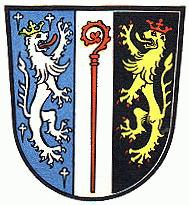Sankt Ingbert (kreis): Difference between revisions
Jump to navigation
Jump to search
Knorrepoes (talk | contribs) m (Text replace - "'''Origin/meaning :'''<br/>" to "====Origin/meaning====") |
Knorrepoes (talk | contribs) m (Text replace - "|width="15%"|50 px|right |} " to "|width="15%"|50 px|right |}<seo title="Wappen, Gemeindewappen" /> ") |
||
| Line 3: | Line 3: | ||
|width="70%" align="center" |'''Heraldry of the World<br/>Civic heraldry of [[Germany]] - [[Deutsche Wappen|Deutsche Wappen (Gemeindewappen/Kreiswappen)]]''' | |width="70%" align="center" |'''Heraldry of the World<br/>Civic heraldry of [[Germany]] - [[Deutsche Wappen|Deutsche Wappen (Gemeindewappen/Kreiswappen)]]''' | ||
|width="15%"|[[File:Germany.jpg|50 px|right]] | |width="15%"|[[File:Germany.jpg|50 px|right]] | ||
|} | |}<seo title="Wappen, Gemeindewappen" /> | ||
'''SANKT INGBERT (IGB)''' | '''SANKT INGBERT (IGB)''' | ||
Revision as of 19:23, 5 November 2012
| Heraldry of the World Civic heraldry of Germany - Deutsche Wappen (Gemeindewappen/Kreiswappen) |
SANKT INGBERT (IGB)
State : Saarland
Incorporated into 1974 Saarpfalz Kreis
Origin/meaning
The arms were granted on July 16, 1962.
The arms are a combination of the lions of Saarbrücken and the Pfalz and represent the parts of the district that belonged to Nassau-Saarbrücken and the (Kur)Pfalz. The pale is taken from the arms of the Von der Leyen family, who had large possessions in the district from the 15th century until 1792 (and also abroad, see Simpelveld in the Netherlands). They had one of their castles in Blieskastel.
The crosier represents the areas in the district that belonged to several monasteries.
Literature : Stadler, K. : Deutsche Wappen - Bundesrepublik Deutschland. Angelsachsen Verlag, 1964-1971, 8 volumes.

